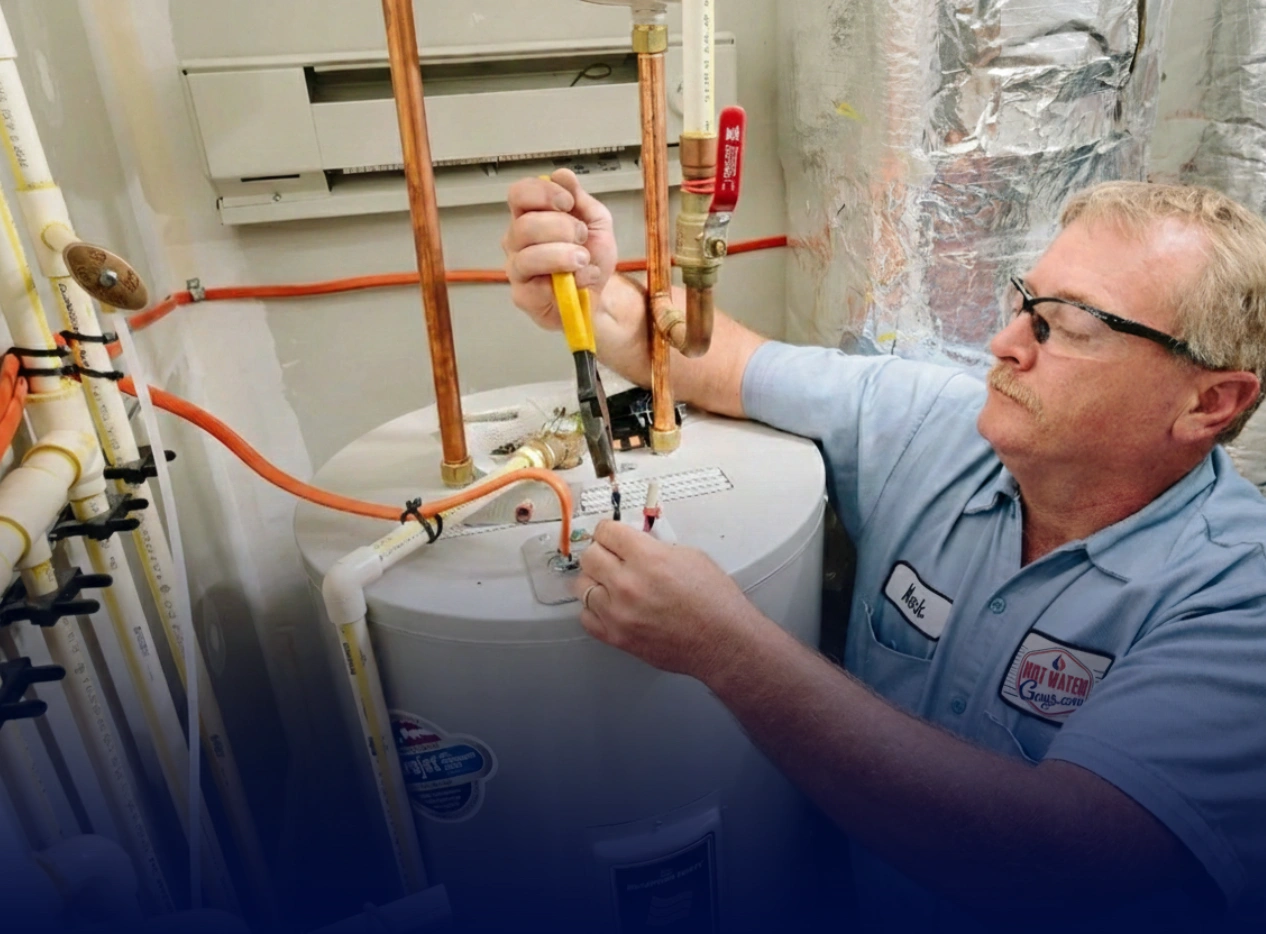services


any questions?
Regular maintenance, such as flushing the tank to remove sediment, inspecting the anode rod, and checking the pressure relief valve, can help prevent future issues. For tankless water heaters, descaling and regular servicing are essential.
The cost of repairing a water heater can vary depending on the nature of the issue, the type of water heater, and the extent of the repair. On average, repairs can range from $250 to $1200. More complex issues may cost more.
Yes, both tankless and traditional water heaters can be repaired. However, the type of repair will depend on the specific issue and the type of water heater. Professional technicians are trained to handle repairs for both types of systems.
Signs that your water heater needs repair include a lack of hot water, water taking too long to heat, water discoloration, reduced water flow, and unusual noises. Any of these issues should be addressed promptly to avoid further damage.
Common issues include no hot water, inconsistent water temperature, leaks, strange noises, and error codes. These problems can affect both tankless and traditional water heaters and require professional repair.
Regular maintenance can significantly extend the lifespan of your tankless water heater by preventing issues that could lead to costly repairs or system failure. It ensures the unit operates efficiently and reliably over its lifespan.
Signs include inconsistent water temperature, reduced water flow, strange noises, or error codes displayed on the unit. These symptoms indicate potential issues that require professional attention.
While some basic maintenance tasks like cleaning the air filter can be done by homeowners, it’s best to have a professional perform thorough maintenance to ensure all components are properly inspected and serviced.
Maintenance typically includes descaling to remove mineral buildup, cleaning the air filter, checking the burner or heating element, and inspecting the venting system. Regular checks ensure that all components are functioning correctly.
It is recommended by Manufacturers that once yearly maintenance be performed. However incoming water temperatures, frequency of usage and water quality greatly affect how often maintenance needs to be performed. It’s best to let the Service Technician recommend maintenance frequency.
Consider the hot water demand, the number of fixtures, the type of fuel (natural gas, propane, or electric), and the specific requirements of your property. Consulting with a professional can help you determine the best system for your needs.
Commercial tankless water heaters are highly efficient as they only heat water on demand, reducing energy waste. This efficiency translates to significant savings on utility bills, especially for businesses with high hot water usage.
Yes, regular maintenance is crucial for commercial tankless water heaters. This includes descaling, checking the heating elements or burners, and ensuring proper ventilation. Routine maintenance helps prevent breakdowns and extends the system’s lifespan.
Depending on the hot water demand, multiple tankless water heaters can be installed in parallel to meet the needs of large commercial properties. This setup ensures that the system can handle simultaneous usage from multiple fixtures.
Tankless water heaters provide endless hot water, energy savings, and space efficiency, making them ideal for commercial properties with high hot water demand. They also have a longer lifespan compared to traditional water heaters.
The cost to install a tankless water heater can range from $3,000 to $6,500, including the unit and installation. Factors affecting the cost include the type of heater, installation complexity, and any necessary upgrades to your home’s plumbing or electrical systems.
Tankless water heaters require proper venting, a dedicated gas line or sufficient electrical capacity, and a location that prevents freezing. Professional installation is recommended to ensure safety and optimal performance.
Technically, no. Tankless heaters heat water on demand, providing an endless supply. However, every unit has a maximum flow capacity. If you demand more hot water than the unit can handle at once (e.g., running three showers simultaneously), a properly sized tankless heater will automatically reduce the water flow to ensure the temperature remains consistent. You won't get cold water, but you may notice slightly lower water pressure.
Yes, tankless water heaters are more energy-efficient than traditional tank water heaters. They only heat water when needed, reducing energy consumption and lowering utility bills. On average, they can be 24-34% more efficient for homes that use 41 gallons or less of hot water daily.
A tankless water heater heats water on demand rather than storing it in a tank. When you turn on a hot water tap, cold water flows into the unit and is heated by a gas burner or electric element before being delivered to the faucet. This process provides a continuous supply of hot water without the need for a storage tank.
.webp)




